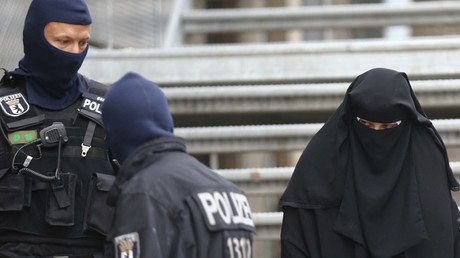Underage refugee suspect in rape & murder of female student – German Police

German Police have arrested a suspect, an Afghan teenage refugee, in a high profile sexual assault and murder case that has kept the residents of Freiburg, Germany in suspense for months.
A medical student officially identified only as Maria L., 19, was raped and allegedly drowned on the night of October 16, when she was returning to her residence hall from a student party by bicycle. Her body was found the next morning by locals on the bank of the Dreisam River in Freiburg, home of one of Germany’s elite universities.
The case sparked massive public outcry, prompting police to form a special group consisting of about 40 investigative officers and forensic specialists. After an investigation that lasted for more than a month, police finally arrested the alleged murderer and rapist on Friday.
“The suspect is a minor, 17, from Afghanistan, who came to Germany in 2015,” Dieter Inhofer, the regional chief prosecutor, said at a press conference following the arrest.
A single strand of black hair partially dyed blonde, a scarf found on the riverbed, and several DNA samples found on the victim’s body and at the crime scene led investigators to the suspect, police revealed during the press conference.
“We were able to speak to the foster family,” David Mueller, head of the special investigative group, told journalists, but refused to reveal the nature of the conversation. “The suspect still refuses to testify,” he added.
The suspect was charged with sexual assault and murder, police said during the press conference, adding that it is yet unknown whether he deliberately drowned the victim or threw the woman in the water while she was unconscious.
“The death occurred due to drowning,” Mueller said, stressing that it is the only fact confirmed so far regarding the victim’s death.
It was also confirmed that the suspect entered Germany illegally and later filed an asylum request as an unaccompanied minor. He then lived with a foster family in Freiburg. He had been charged once before with inflicting bodily harm, but the case was later dropped, police told journalists during the press conference without giving further details.
It is yet unclear if the suspect and the victim had known each other before the incident, or if the attack was planned in advance.
Police also mentioned a similar incident in the nearby town of Endigen, just 30 kilometers from Freiburg, where a woman, 27, was also raped and murdered weeks after Maria L.’s death. No links between the two cases have been found, though a connection might still be investigated, Inhofer said.
“We will have no rest. We will thoroughly examine every lead and will look under every rock – many times, if needed,” Bernhard Rotzinger, head of the Freiburg Police Department, said on Friday.
Meanwhile, the news has provoked outrage on social media, where people once again blamed German Chancellor Angela Merkel’s open-door policy for what happened in Freiburg.
READ MORE: Christian refugees persecuted by Muslim asylum seekers in German shelters – survey
“Angela Merkel, look here! Blood of this person is on your hands!” a Twitter user wrote in a post featuring a photo of the victim.
Schau hin, Angela Merkel! Das Blut dieses Menschen klebt an Deinen Händen! #freiburgpic.twitter.com/IWVTCoIyMD
— Cassandra (@cassandralipsia) December 3, 2016
🆘‼️😡🔥 #Germany: Police arrested the killer who raped and killed female medical student in #Freiburg. "17 YEARS OLD AFGHAN!" Thanks Merkel!!! pic.twitter.com/hMzGLaiqiE
— Onlinemagazin (@OnlineMagazin) December 3, 2016
Some Twitter users expressed outrage over the situation and mocked the slogans used by advocates of the open-door policy.
The murderer & rapist is a 17 year old illigal migrant from Afghanistan who has been known to police for previous violent offenses #Freiburghttps://t.co/S3M5PGyqIG
— Kraut and Tea (@Kraut_and_Tea) December 3, 2016
for non-Germans: We had cultural enrichment in #Freiburg where a 19 year old med student was raped and murderd by an Afghan illigal migrant.
— Kraut and Tea (@Kraut_and_Tea) December 3, 2016
“This is just nonsense: [we] provide for the murderers of our daughters. That is apparently a Stockholm syndrome,” another Twitter user wrote.
@otto5699@patriarchator@DLF Wahnsinn. Spenden für die Mörder der eigenen Tochter. Stockholm Syndrom offensichtlich. #freiburg#marial
— Reiner Wein (@HirnVHimmel) December 4, 2016
Many others criticized the German media for their reluctance to cover the story, dismissing it as “an incident of regional significance.”
Die in #Freiburg ermordete Studentin, hat für die #ARD nur eine regionale Bedeutung. @tagesschau@ARD_Presse#schauhinpic.twitter.com/gT7z86ihQA
— AG Nordheide (@AGNordheide) December 4, 2016
Wie damals bei #Köln hat @tagesschau doch nur deshalb nicht über #Freiburg berichtet damit alte Wähler ohne Internet nix davon erfahren.
— darksideoftheegg (@darksideoftheeg) December 4, 2016
Following the outrage, Freiburg Mayor Dieter Salomon called for discretion and urged Germans “not to draw generalized conclusions from the suspect’s origin and regard [the incident] as an isolated one instead,” Die Welt reported.
Victim a ‘refugee activist, daughter of EU official’
Journalist and author Oliver Janich said he discovered that the murder victim was Maria Ladenburger, daughter of Clemens Ladenburger, who has been an assistant to the Director-General of the European Commission's Legal Service since 2008.
Janich also established that the victim had worked as a volunteer in one of the local refugee shelters in her spare time.
Ladenburger and his wife Friederike have since placed a memorial notice for their daughter in the Frankfurter Allgemeine Zeitung.
READ MORE: Germany drafts law to install face-recognition cameras in public places – media leaks
Echoing some of the tweets, Germany's anti-migrant AfD party blamed the "uncontrolled" influx of foreign undocumented migrants, with the local police union reminding of the "dangers that go along with massive immigration," according to AFP.
But some politicians wished to dispel the atmosphere of fear. Vice Chancellor Sigmar Gabriel told Bild the murder should not serve as basis for anti-refugee hatred, especially given that "Such horrible murders already happened before the first Afghan or Syrian refugee arrived here."
"We will not allow incitement after such violent crimes, no matter who commits them."
Germany sustained a massive influx of approximately 900,000 refugees last year, with up to 300,000 expected to arrive this year, according to Frank-Jurgen Weise, head of the country’s migration agency BAMF.
A total of 21,000 rejected asylum-seekers were repatriated in 2015, and an additional 35,000 in the first seven months of 2016, German Interior Minister Thomas de Maiziere said at a cabinet meeting in August.
In late November, Merkel announced that up to 100,000 rejected asylum-seekers would be returned from Germany to their home countries by the end of the year.














